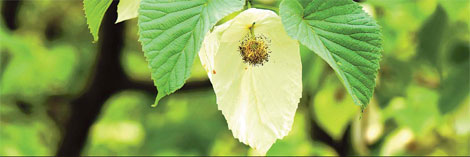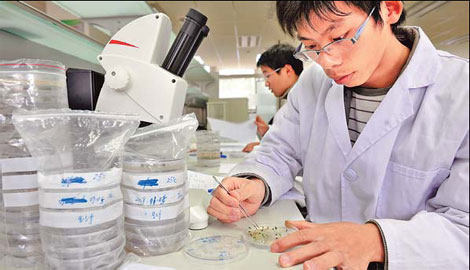'Noah's Ark' gives rare plants seeds of survival
Intrepid scientists protect China's wealth of plant life. Trekking into the wild unknown and scaling sheer cliff faces is probably not in the typical botanist's job description.
Then again, Cai Jie is not your typical botanist.
 |
|
Davidia involucrata is an endangered species growing in Southwest China. The seed bank at the Kunming Institute of Botany is aiming to protect China's most rare plants. |
As collection coordinator for China's first national seed bank for wild plants, the 31-year-old spends much of his time searching for endangered plants in some of Southwest China's most challenging terrain.
"You can't just drive along and collect plants growing on the side of the road," said Cai, who has led many field expeditions for the bank at the Kunming Institute of Botany in Yunnan province.
"You have to trek into the wild, through mountains and high altitudes, where it's sunny one minute and spitting hailstones the next.
"In Guizhou province and the Guangxi Zhuang autonomous region, a lot of the terrain is limestone. You hang on with one hand and collect seeds with the other."
Although hazardous, the work done by Cai and his team is vital in efforts to protect China's more than 30,000 species of plant life, half of which cannot be found anywhere else in the world.
 |
|
Scientists nurse different plantlife in the laboratory in the germplasm and seed bank in Kunming, Yunnan province, which is the largest of its kind in Asia, with a capacity of 170,000 samples. |
"China has as much flowering plant diversity as the rest of the Northern Hemisphere put together," said David Paterson, the institute's honorary senior horticulturalist and former director of the Royal Botanic Garden in Edinburgh, Scotland.
With at least 20 percent of the country's species already seriously threatened, the seed storage facility at the Germplasm Bank of Wild Species in Yunnan safeguards plants from habitat destruction, climate change and invasive alien species, and makes their valuable genetic information available to researchers.
Seed banking protects species outside of their original habitat, an approach known as "ex situ conservation", while "in situ" methods preserve the habitat, such as by marking natural reserves.
Protecting habitats is unquestionably the best approach but not always feasible, said Li Dezhu, director of the institute and germplasm bank.
As a student working toward his master's degree, Li sampled a species of bamboo in Yunnan at its only known recorded location. When he returned years later, though, he could not find it in a landscape transformed by development and agriculture.
While some conservationists view seed banks as a last resort, he believes they are a necessary defense against increasing environmental pressures.
"If one habitat is lost, plants may learn to survive in another habitat," he said, "but with climate change there is double pressure on a species. If we can preserve their seeds, like Noah's Ark, we can eventually reintroduce these species back into the wild."
Banking is also an important solution when plants produce too few seeds to sustain the wild population and when natural reserves cannot be established, perhaps due to cost or conflicts with economic development, added Xue Dayuan, chief scientist for biodiversity conservation at the Nanjing Institute of Environmental Science.
"The seed bank is essential for protecting rare and endangered species," he said. "China needs ex situ conservation because it's vastly better than letting a species vanish completely."
Once at the germplasm bank, seeds are cleaned to remove husks and debris and then dried. Many seeds can theoretically be stored for hundreds to thousands of years at -20 C and are germinated every five to 10 years to test for viability.
 0
0 






